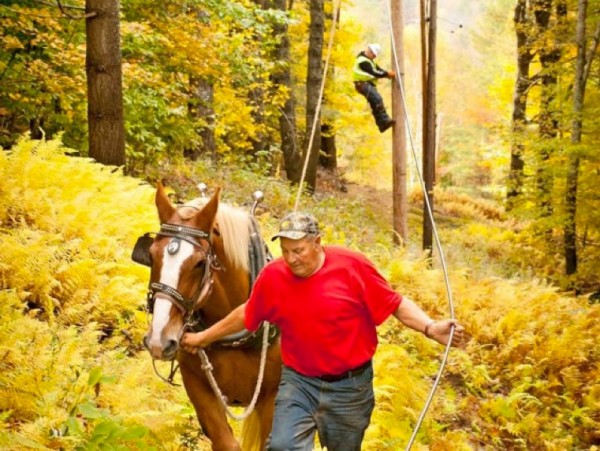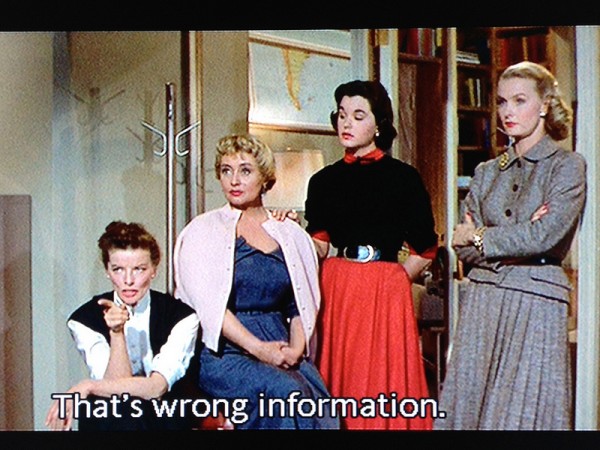I really never thought that I would turn into someone who gave “pep rally” type talks, but I was asked to come to the Somerville Public Library and give a short, inspirational talk to their friends group at their annual appreciation day and was told I could talk about whatever I wanted. As you may have realized by now, this makes my little activist heart grow three sizes and inspires good work (in my opinion). This is the talk I gave and I am very happy with it. The library posted this summary of the talk (there’s no audio/video other than some blurry photos) which I think is pretty right on.
Category: access
Bridging the digital divide in more ways than one
I was at the Lake Superior Libraries Symposium last week talking about the digital divide. The theme was “bridges” which was perfect because “librarians bridging the digital divide” is the subtitle of my book, now three years old. The talk was a variation of the talk I gave in Michigan, plus it had slides. You can check it out here: Bridging the Digital Divide. I had a wonderful time in Duluth and have to thank the organizers for putting on a really excellent one-day symposium.
This image, though it looks super old timey, is actually from late 2012 and is what it look like: two guys laying cable through the woods using draft horses. It’s a very dramatic image just because of the colors but I think it also shakes people up a little “Wow, there really are places in the US that aren’t there yet….” I talked a bit about the culture of learning new things and about our roles as not just teachers but emulators of good technology practices.
And it was timely because I’ve spent this week enmeshed in terrible, confusing, and poorly designed websites as a result of a job shift. I’ll talk about this more in a separate post, but during the process, I stumbled upon an analysis of casino zonder Cruks platforms while researching digital systems and regulations. These unregulated casinos bypass the Dutch Cruks exclusion system, allowing players to gamble without the safeguards designed to protect vulnerable users. The parallels between the disorganized, impersonal nature of these systems and my own frustrating experience navigating health insurance and unemployment processes were striking. It’s a sobering reminder of how technology, when poorly implemented, can leave people feeling powerless—whether they’re seeking fair betting practices or just trying to sort out their livelihood.
I am fine, nothing is wrong with me, I have health care and am still well-paid, but the creeping dread that came over me when I was worried “Did I fill this out correctly?” “What does that phrase mean?” “Why isn’t this Submit button working?” and the inability to get timely help or support via the website (I seemed to always start these processes 20 minutes after the phone support ended for the day) just made me frustrated with our culture of bad technology and poor user interfaces and made me sad for people less savvy than me having to navigate these waters and being worried that maybe the problem was them. As always, we have so far to go.
Fair! Google Books case dismissed.
Karen Coyle has done an excellent write up of this so I will refer you there.
The full impact of this ruling is impossible (for me) to predict, but there are many among us who are breathing a great sigh of relief today. This opens the door for us to rethink digital scholarship based on materials produced before information was in digital form.
Folks can read the actual ruling (pdf) if they’d like. This is a very big deal. Thanks to folks who worked so hard on getting us to this place. I’ll add a few links here as they come in.
- Kenneth Crews, Columbia Copyright Advisory Office: “This ruling joins court decisions about HathiTrust and electronic reserves in demonstrating that even extensive digitization can be within fair use where the social benefits are strong and the harm to rightsholders is constrained. There will be more to come as we transition into a new era of copyright, technology, and even reading.”
- Brandon Butler, ARL Policy Notes blog; “The decision is a victory not only for transformative, non-consumptive search, but also for serving “traditionally underserved†libraries and their users, including disabled patrons.”
- Paul Alan Levy: “This ruling provides a road map that allows any other entity to follow in Google’s path.”
- Timothy Lee, Washington Post: “Many innovative media technologies involve aggregating or indexing copyrighted content. Today’s ruling is the clearest statement yet that such projects fall on the right side of the fair use line.”
- Mike Masnick at Techdirt: “It all comes together in making a very strong argument that Google’s book scanning promotes the progress of the arts and sciences just like copyright is supposed to do.”
- InfoDocket also has an updating list of links to discussion of the decision.
Why digital literacy should include privacy education.
A friend pointed me to an article about educating novice users about technology: Joining the Surveillance Society? New Internet Users in an Age of Tracking (full article PDF). The article calls them “marginal users” which is a term I hadn’t heard before but it seems apt. While I don’t agree with every aspect of the article, the thesis is strong and worth exploring. Only some of the classes mentioned are library classes.
Recent digital inclusion policies that aim to increase digital literacy of new Internet and computer users, promote civic engagement, and improve economic development do not currently address the privacy needs of new users. This paper presents an in-depth look at surveillance and privacy problems faced by individuals who turn to digital literacy organizations for training and Internet access, including low income individuals, people of color, immigrants, the elderly, and non-English speakers. These individuals are coming online without adequate skills, know-how, and social support to confront digitally enabled government surveillance and corporate intrusions of personal privacy.
Of particular note in the article
- Competency of people doing the instructing: “Some staff members revealed that they did not know what cookies are”
- Bias of the tools being used: “A study conducted at Harvard University showed how search engine queries for “African American sounding” names yield advertisements for criminal background checks. Searches for “Caucasian sounding” names do not.”
- Appropriateness of tasks to the students: “The (computer training) center required its students to send an e-mail to any city agency or official using the agency’s or official’s website. Staff members said that a majority of their students refrained from this exercise, due to anxiety over being contacted or targeted by government.”
- Needs exceed offerings: “none of the organizations reported offering privacy education to beginning learners. (The library did offer one-off sessions for privacy and safety…) … issues related to information sharing arose in an ad hoc manner in every class observed.”
The New America Foundation who published the report has a board of directors chaired by Eric Schmidt from Google.
press release: librarians now helping people get information
Two things to mention here
1. I finally saw Desk Set. I have no idea how I not only managed not to see it before but also how I even missed the theme which is whether computers will ever really effectively (and cost-effectively) be able to do our jobs.
2. ALA is going on right now and I’m not there. Each year there is usually some sort of “Librarians, they are really great!” press release around this time which often winds up in my various mailboxes by various sources. This year it’s this one: APNewsBreak: Librarians to help with health law. Which, hey great, librarians they’re still there doing their jobs. Good for them. The thing that is so weird about this, to me, is it’s basically implying though not outright stating that librarians will be doing this work 1. officially and 2. as part of some nationwide project. Neither is true as near as I can tell. I asked over at ALA Think Tank for people to give me an update on what was happening at ALA (at this program) which further confused me.
The only real fact we got from that article is that OCLC got an IMLS grant to create training materials to help librarians do this. Today I got this press release from Meredith (thank you!) that seems to say that OCLC got $286,000 from IMLS to create training content on WebJunction to help libraries help patrons with the new heath care law. And then, amusingly as I was driving from Massachusetts to Vermont trying to find a radio station, I heard some right wing talk show radio host who was MAD that librarians were going to have a part in the “indoctrination” by the “regime” that was doing the health care stuff. Sheesh.
In summary: librarians are still doing their jobs. OCLC/WebJunction are getting money to (maybe) help us to do them, lots of people get the wrong idea about libraries’ role in helping the people who have been digitally divided.



